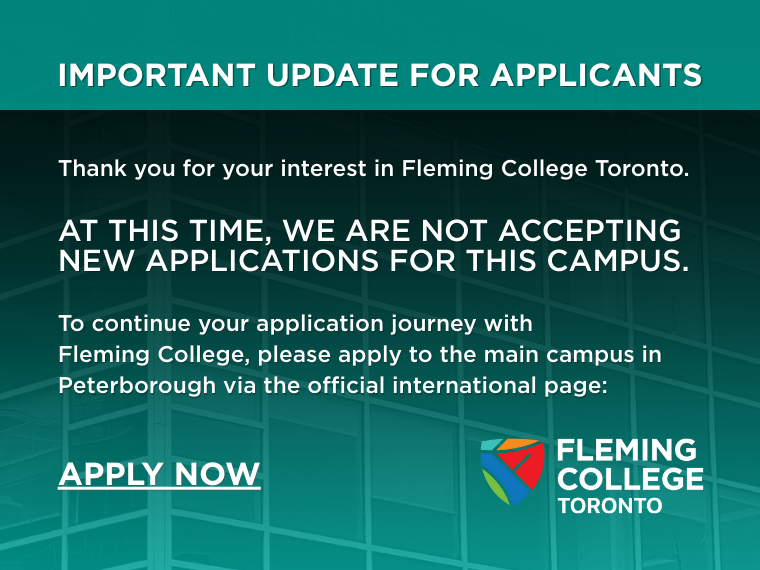Firmly rooted in a Canadian and provincial healthcare context, with a strong focus on Indigenous perspectives, this program will prepare you to become a partner in care, lead interprofessional healthcare teams, and be adept in the ever-changing landscape of the Canadian healthcare system.
-
Program Code:
-
HCT
-
Credential:
-
Graduate Certificate
-
Duration:
-
Two Years
(four semesters)
-
Intakes:
-
Fall (September),
Winter (January),
Spring (May)

Fees
| Semesters | Semester 1 | Semester 2 | Semester 3 | Semester 4 |
|---|---|---|---|---|
| Tuition | $8,175.00 | $8,175.00 | $8,175.00 | $8,175.00 |
| Ancillary Fees | $502.49 | $460.99 | $502.49 | $460.99 |
| Health Insurance | $700.00 | N/A | $700.00 | N/A |
| Semester Total | $9,377.49 | $8,635.99 | $9,377.49 | $8,635.99 |
| Academic Year Total | $18,013.48 | $18,013.48 | ||
| Total Program Fees | $36,026.96 | |||
*Tuition and fees subject to changes.
*Health insurance is mandatory and non-refundable.
Program Highlights
- Learn to manage diverse environments within the Canadian healthcare setting.
- Consolidate your skills and knowledge with a work-integrated learning experience in the form of a capstone project or work placement.
- Gain business and leadership fundamentals and foundational knowledge in finance, human resources, health equity, truth and reconciliation, and change management.

Why Choose Fleming College Toronto
- Access an extensive suite of support services, such as career services, academic advising, wellness counselling and more.
- Learn in a supportive environment that values both the theoretical and practical sides of skill development in college education.
- Enjoy the benefits of cosmopolitan life, including a thriving job market, cultural diversity and networking opportunities.
- Build your network with international classrooms and unprecedented access to Canada’s bustling business and finance capital, Toronto.
Minimum Admission Requirements
Students applying to Health Care Management – Canadian Context must meet the following requirements:
- Ontario College Diploma, Ontario College Advanced Diploma, Degree, or equivalent in a health-related field.
- Successful competition of Fleming College Toronto English Language Bridge Level 6 or provide IELTS Academic Overall 6.5 with no band score less than 6.0 or equivalent (students applying through the SDS stream must have an overall 6.0 with no band less than 6.0). Review the Language Requirements page for additional options.
Technology Requirements
Students are required to have their own computer, internet access, webcam and microphone. Some required software applications are not available for MAC OS or Chromebook. Computer must be virtual machine capable. No tablets or Chromebooks for lab work. For this program, the following system specifications are required:
Microsoft Computer
Operating System: Windows 10
Processor: Core i5 – 1.6 GHz
Memory: 8 GB
Hard disk: 160 GB
Apple Computer
Operating System: MacOS 10.12
Processor: Core i5 – 6th Gen
Memory: 8 GB
Hard disk: 160 GB
Internet
Download speed: 2.5 Mbps
Upload speed: 3.0 Mbps

Career Opportunities
This program will prepare you for a range of healthcare leadership roles, such as:
- Nursing Administration
- Management in Occupational Therapy
- Management in Physical Therapy
- Health Services Management
- Homecare Management
Program Courses
Effective communication is critical in the Canadian healthcare context. Strong, empathic leaders create a culture of safety, where staff is encouraged to report errors and near-misses, leading to continuous improvement. The healthcare landscape is constantly changing, with new technologies and treatment modalities emerging. Strong leaders encourage innovation and help their organizations adapt to new developments in the field. Healthcare is often provided by multidisciplinary teams. Effective leaders facilitate collaboration, communication, and coordination among healthcare professionals to ensure seamless patient care. Healthcare leaders and collaborators are responsible for making critical decisions, from patient care protocols to resource allocation. Sound decision-making skills are essential to ensure optimal patient outcomes and efficient use of resources. Healthcare is an ever-evolving field, and leaders must continually work to improve the quality of care. They set and monitor quality standards, implement best practices, and encourage a culture of continuous improvement. Healthcare leaders set the ethical tone for their organizations. They must adhere to high ethical standards, which in turn promotes a culture of integrity and ethical behavior among staff.
This functional course will provide an overview of the Ontario Healthcare System. Students will examine the interdisciplinary role of healthcare professionals. Based on examination, students will dialogue about current issues and trends that impact the Ontario healthcare system, within the context of sustainability.
This course provides students with an introduction to critical components of healthcare operations. With the increasing health human resource challenges, maintaining smooth organizational operations is an increasing challenge. Through the use of real-world scenarios and case studies, students will explore organizational structures, staffing models, and skill development requirements. Emphasis will be placed on promoting operations that balance client/patient care needs and staff wellness and satisfaction, as well as operational procedures that align with practices of equity and cultural safety for patients accessing the healthcare system.
This course is an introduction to the study of Indigenous (First Nations, Metis, and Inuit) peoples in Canada. Students will explore the complex historical and contemporary relationships between Indigenous and non-Indigenous peoples. The course will also guide students to begin to understand the diversity and depth of Indigenous societies, worldviews, and knowledge through a multi-disciplinary lens.
This course provides students with an introduction to the foundations of the law as it relates to health care administration in a provincial and national context. Emphasis will be placed on establishing and maintaining legal compliance in an administrative and occupational setting. The course investigates the role that ethics and sound decision-making play in healthcare leadership and administration.
In this course, students will explore leadership and management approaches in Canadian healthcare organizations. Emphasis will be placed on developing effective people management strategies, professional communication, planning, decision-making, conflict resolution, effective team building, and navigating change. Effective communication skills are essential for leaders in a healthcare environment. Students will use various methods to reinforce the strategic and operational goals of an organization. Various tools and technologies will be explored to maximize operational efficiencies to support successful stakeholder interaction.
This course provides an overview of the Canadian healthcare system, and the provincial context. Including relevant legislation and healthcare policies, as well as funding and governance structures across the healthcare spectrum. Students will analyze healthcare policies and their impact on health equity/inequity and particularly how historical and current policies, practices, and legislation have impacted health outcomes for Indigenous Peoples.
This course is a General Education elective. It explores the concepts of sustainable development and sustainability and the social, economic and environmental forces that shape the destiny of our community and planet. The course explores population growth, consumption patterns, climate change, and their role in the degradation of the natural ecosystem and biodiversity. Social, environmental and Economic considerations are examined in the broader framework of sustainability and social justice and the 17 Sustainable Development Goals established by the United Nations. The course also examines and explores selected sustainability measurements currently in use.
Effective communication skills are essential for leaders in a healthcare environment. In this course, students will enhance their understanding of leadership and management approaches in Canadian healthcare organizations. Emphasis will be placed on developing effective people management strategies, professional communication, planning, decision-making, conflict resolution, effective team building, and navigating change.
An in-depth exploration of management accounting in health care, focusing on tools and techniques that develop analytical skills in finance. Theory, practical problems, and mini cases are used to illustrate successful healthcare leadership decision-making.
Patient safety is paramount in any healthcare setting. This course will provide students with the knowledge and skills to lead quality and patient safety improvement initiatives in their roles as future leaders. Learners will explore the key sources of research and best practice evidence that organizations need to manage key patient safety and risk issues. Students will learn key fundamentals in Quality Improvement methodologies and be able to apply quality improvement strategies to relevant patient safety issues.
This course will deepen students' understanding and appreciation of the role of social determinants of health in the lives of the patients/clients they care for. Emphasis is placed on how healthcare leaders can mitigate negative impacts and increase equity in healthcare at the program development and care delivery levels. Underpinning everything is students' ability to recognize and counteract their own biases. Throughout this course, self-reflection and experiential learning will allow health professionals to develop a cultural competence component to their foundational skills.
The growth of electronic medical records, business intelligence tools, and predictive analytics requires healthcare leaders to be familiar with the benefits and risks of these tools. This course introduces the field of health informatics & computer applications for healthcare management including ways in which technology can enhance clinical care and healthcare decision making. Students will begin to analyze how data is generated, how it is used, and the importance of ensuring data quality.
Leadership and management are intertwined concepts but with distinctly different skill sets, goals, and outcomes. In this course, students will explore leadership theories and frameworks and apply these to real-world scenarios and case studies to understand how to leverage and enhance their leadership competencies to achieve the strategic and operational goals of an organization. Various tools and technologies will be explored to maximize operational efficiencies to support successful stakeholder interaction.
In this course, students will be introduced to leadership decision-making on operational effectiveness. Using case studies, students will be introduced to the multiple challenges faced by current front-line managers including environmental factors that affect operational planning, implementation, and metrics. Critical thinking, resourcefulness, and decision-making will be applied to management and leadership challenges in healthcare environments.
An introduction to effective project management based on PMI principles that provide students with the techniques to manage projects in corporate and entrepreneurial environments.
Exploring concepts from data management to predictive analytics and the role of AI, this course will explore the diverse types of analytics; and the ways that healthcare leaders can use data to understand patterns of care delivery, organizational behaviour, and patient outcomes; how to use data to communicate with decision-makers, funders, and other key stakeholders; and future trends and directions of AI and data.
This course will support students in developing their capacity for analyzing and solving the real-world challenges and complexities of the national, provincial, and regional healthcare landscapes. In this course, students will look across the industry at relevant legislation and ethical frameworks to consider the ways in which they impact decision-making at the leadership level. To support continuous improvement across the sector, students will also explore examples and case studies that highlight innovative leadership strategies and effective problem-solving.
This course will provide students with an overview of common governance structures in health care and the reporting and organizational structures that underpin them. Using case studies with real-world examples of common issues, students will gain an in-depth understanding of the legislative frameworks that guide formal board and Ministry reporting in various healthcare settings; the role of physicians and other key stakeholders in governance, and how these structures can enhance or limit quality improvement and change management activities.
Funding for many types of grants, contracts, and even programs can be accessed through effective proposal writing. Students will gain an understanding of how funding opportunities and challenges can impact organizational success in complex and changing contexts. Emphasis is placed on developing strategies to maximize capacity and resources to contribute to sustainable, financially responsible, and productive healthcare operations.
This course will provide students with a foundational overview of the fundamentals of HR management and look in-depth at the health human resource workforce in Canada. It will include an overview of the regulated health professions and their governing bodies and the various pieces of legislation and healthcare policy that shape the ways in which healthcare workers practice in Canada. The topics covered include hiring, supervising, and managing employee performance and development. The course will also offer a look at organizational culture with the goal of supporting psychologically safe workplaces and advancing practices for leaders to nurture healthy work environments.
This course will explore the role of innovation, partnership, and collaboration in health care to improve health in the broadest sense for individuals and populations. A range of partnership forms will be explored including, for example, formal and informal partnerships, Ministry-supported integrations, joint ventures, and memorandums of understanding. Students will gain an understanding of how to form coalitions, how to manage change in a partnership context, how funding opportunities and challenges can impact collaboration, as well as how external factors can help or hinder collaboration opportunities.
Identification and management of the processes governing internal and external change are detailed in this course. Students will learn to create the proper documentation to ensure the achievement of project objectives including the principles of Agile Project Management.
This course will ask learners to critically analyze historic and current components of the Canadian and Ontario healthcare systems to address some of the systemic inequalities in the healthcare system because of colonization. To take steps towards reconciliation, learners will integrate Indigenous perspectives, values, and history to support cultural safety in healthcare. The course includes self-reflection, a major paper or project, and intensive onsite experiential learning components.
This course integrates theory and knowledge from previous core courses within the program and builds on this with new knowledge related to the WIL experience. Remote networking and making connections can be a significant challenge for students while communication and connection can be for employers. In this course learners will develop a presentation and build a portfolio, they will establish core professional competencies and be evaluated according to organizational standards.
This course will ensure WIL students are prepared to be successful. Students will have an opportunity to focus on new learning to support individual external practicum project requirements through a combination of applied lab practice activities, article reviews, student research, and other experiences. Onboarding activities for WIL students encourage the development of professional and interpersonal skills through mentorship and/or routine performance check-ins.
This 12-week work-integrated learning is the final component of the program which represents a capstone learning experience and will provide an opportunity for students to synthesize, integrate and apply learning in a professional environment. Individual learners will have the flexibility to define a workplace project or placement through a community partner, employer, or institution. Students work with WIL employers to set learning goals for themselves, monitor progress, and take advantage of networking and mentorship opportunities in order to maximize the benefit of their WIL experiences. All capstone experiences and performances will be supervised by a qualified professional or faculty member.
Frequently Asked Questions (FAQ)
It will help you acquire the technical knowledge and hands-on skills to apply to many diverse healthcare settings. This program will also help you consolidate your skills and knowledge with a work-integrated learning experience.
Generally, certificates focus on providing more hands-on training, compared to a degree, which tend to focus on theory and research. However, there are always exceptions, so it is best to do your own research to find the right program for you.
The Health Care Management Graduate Certificate program prepares you for many career opportunities in diverse management roles in occupational therapy, health services, physical therapy and more.





